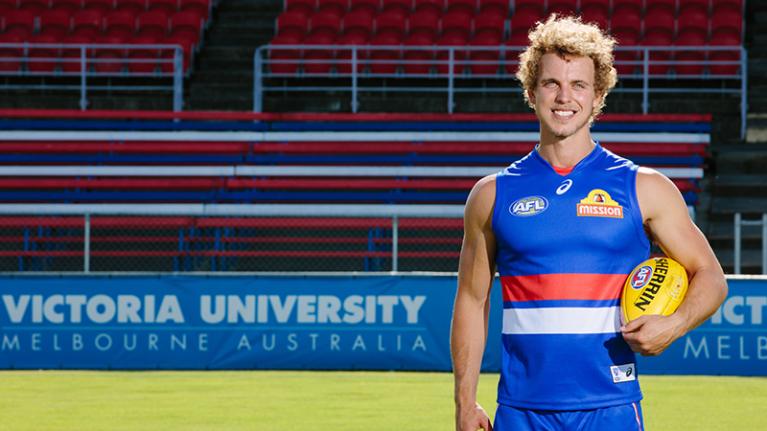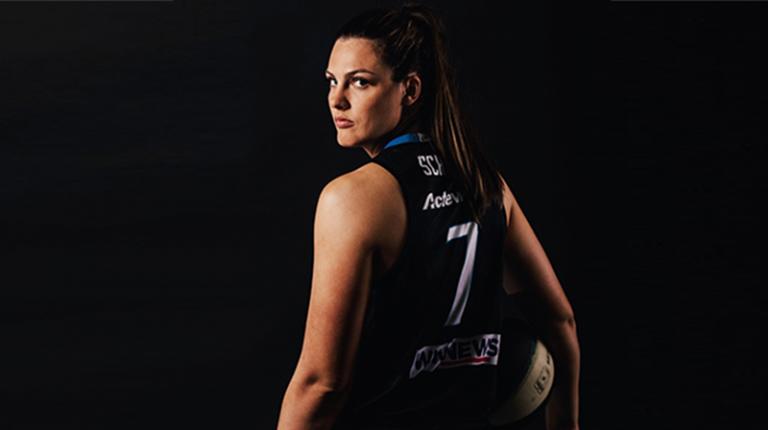Overview
Enjoy a lifelong career inspiring others with your passion for physical activity and sport with a Bachelor of Physical Education & Sport Science at Victoria University (VU).
Take advantage of our position as #7 in the world for sport science, thanks to our ground-breaking research, world-class facilities and partnerships with some of the world’s top sporting clubs.
Studying at VU means you’ll benefit from all of the opportunities that come with our elite status – learning from academics who are connected with top organisations, researching with national sporting bodies and accessing our cutting-edge sport-science equipment.
In this top-rated physical education and sport science degree, you’ll study a range of subjects across disciplines such as:
- games and sports
- skill acquisition
- motor development
- inclusive physical activity
- anatomy
- kinesiology
- health
- exercise physiology
- biomechanics
- individual fitness activities
- aquatics and athletics
- nutrition.
Plus, choose a minor in another discipline area, which can be sport-related or otherwise.
Access to our strong industry partners throughout your studies means you’ll graduate ready to progress your career in the sport industry or continue on to further study if desired.
Connect with our 200+ partner organisations
At VU, our practical approach to learning means your studies will involve connecting with sporting, health and education organisations.
We have over 200 partnerships, including with:
- local schools and community groups
- The Real Madrid Graduate School Unversidad Europea
- Australian Sports Commission
- Australian Institute of Sport
- Western Bulldogs Football Club.
Learn in high-tech sport & exercise facilities
Benefit from learning in our $68 million high-technology teaching and research facility at Footscray Park Campus.
As a VU student, you’ll get access to our 29 new labs fitted with the latest technology and equipment – including biomechanics, biochemistry, exercise physiology, and motor learning and skilled performance labs, and our Altitude Hotel.
You’ll study alongside professional sports teams and community organisations that use our facilities as part of their operations.
Get the foundations for becoming a sports teacher
With a Bachelor of Physical Education and Sport Science, you’ll be ready to start a career in sport science, health or coaching.
If you’re like many of our students, you may choose to progress to a Master of Teaching (Secondary Education) or Master of Teaching (Primary Education) after graduating from this degree.
If you complete this degree then go on to complete a Master of Teaching (Secondary Education), you’ll be able to teach health, physical education and your choice of a third teaching method.
If you complete a Master of Teaching (Primary Education) after this degree, you’ll be able to teach in primary schools.

Our partnership with the Western Bulldogs means you could do practical learning there as part of your Bachelor of Physical Education and Sport Science.
Hear from Elyse, a Bachelor of Physical Education and Sport Science student, about the VU Block Model.
Careers in sport and physical education
The Bachelor of Physical Education and Sport Science will open the door to various career opportunities, including in:
- physical education
- sport science
- fitness
- health
- coaching.
You’ll enjoy career security and wages that are much higher than the average worker, if you continue on to become:
- a physical education (PE) secondary school teacher with a Master of Teaching (Secondary)
- a primary school teacher with a Master of Teaching (Primary Education).
Course structure
To attain the Bachelor of Physical Education and Sport Science, students will be required to complete 288 credit points consisting of:
-
96 credit points of First Year Core units
-
144 credit points of Professional Core units
- 48 credit points of Minor studies from the approved list
Course structure and units
-
- Unit code
- AHE1101
- Credits
- 12
-
- Unit code
- AHE1112
- Credits
- 12
-
- Unit code
- AHE1202
- Credits
- 12
-
- Unit code
- AHE2005
- Credits
- 12
-
- Unit code
- AHE2127
- Credits
- 12
-
- Unit code
- AHE3111
- Credits
- 12
-
- Unit code
- AHE3116
- Credits
- 12
-
- Unit code
- RBM1174
- Credits
- 12
-
- Unit code
- SCL1002
- Credits
- 12
-
- Unit code
- SCL1003
- Credits
- 12
-
- Unit code
- SHE2002
- Credits
- 12
-
- Unit code
- SHE3001
- Credits
- 12
-
- Unit code
- SPE1002
- Credits
- 12
-
- Unit code
- SPE1105
- Credits
- 12
-
- Unit code
- SPE2000
- Credits
- 12
-
- Unit code
- SPE2001
- Credits
- 12
-
- Unit code
- SPE2200
- Credits
- 12
-
- Unit code
- SPE3005
- Credits
- 12
-
- Unit code
- SPE3007
- Credits
- 12
-
- Unit code
- SPE3008
- Credits
- 12
Minors
-
- Unit code
- AMILIT
-
- Unit code
- AMIPSY
-
- Unit code
- AMIHIS
-
- Unit code
- NMIMST
-
- Unit code
- SMIFIT
-
- Unit code
- NMIENV
-
- Unit code
- NMIBIO
-
- Unit code
- EMISWF
-
- Unit code
- SMISCO
Achieve more with the VU Block Model
We are the first Australian university to use a 'block' model of learning, where you study one unit at a time rather than juggling several at once.
Introduced in 2018, the VU Block Model has improved our student results and achievements, and has won awards for innovation and excellence. Initially for first-year students, it now applies to all students studying at our Melbourne campuses.
You'll study in short bursts, called blocks, of three 2-3 hour face-to-face teaching sessions per week.
Each block focuses on one unit (subject) and is only four weeks long, with up to four days between. Our two semesters have four blocks each, and there are optional blocks over winter and summer where you can catch up on a missed unit.
Some courses have labs and pracs too, and these are generally scheduled on the same days as teaching sessions. There are also workshops where you'll develop your study skills and prepare for your future career.
Find out more about the VU Block Model.
Learning outcomes
On successful completion of this course, students will be able to:
| 1. | Integrate knowledge and skills from health, physical education and sport science to become a leader in their area of expertise; | ||
| 2. | Analyse and evaluate theoretical knowledge and technical information from physical education and sport science research to develop knowledge and understanding of professional identity and discipline specific requirements and as a basis for independent lifelong learning; | ||
| 3. | Evaluate and apply information to creatively solve problems related to professional practice, including developing appropriate activities for participation in physical education and sport in contemporary settings; | ||
| 4. | Operate as an independent and collaborative professional who can clearly and coherently communicate physical education and sport science knowledge and ideas; | ||
| 5. | Design evidence-based practice to deliver innovative programs in physical education and sport science; | ||
| 6. | Interpret a variety of physical education and sport science related issues and evaluate professional, evidence-based approaches to address the specific issues; and | ||
| 7. | Adapt knowledge and managerial skills to make decisions that provide inclusive, sustainable and culturally relevant outcomes to issues in physical education and sport science. |
What's a unit?
A unit or 'subject' is the actual class you'll attend in the process of completing a course.
Most courses have a mixture of compulsory 'core' units that you need to take and optional elective units that you can choose to take based on your area of interest, expertise or experience.
Credits
Each unit is worth a set amount of study credits based on the amount of time you study. Generally, 1 credit is equal to 1 hour of study per week.
Admissions
Victoria University is committed to providing a transparent admissions process. Find out more about how to apply for our courses, and our commitment to admissions transparency.
Applicants for this course will need to have met the academic requirements and prerequisites for this course outlined below.
Meeting the minimum admission criteria does not guarantee entry into this course. Past academic performance may be considered.
Entry requirements
Completion of an Australian Senior Secondary Certificate (VCE or equivalent) including Units 3 and 4: a study score of at least 25 in English (EAL) or 20 in any other English (or equivalent).
OR:
Completion of an Australian Advanced Diploma or Diploma (or equivalent).
PLUS:
IELTS (or equivalent): Overall score or 6.0 (with no band less than 6.0 in Listening, Reading, Writing and Speaking).
OR:
Completion of a Foundation course or equivalent.
Find out if you meet the entry requirements, including English language and academic requirements.
Additional information
Students will require a Working with Children Check and National Police Check to be eligible to undertake and participate in workplace visits, placements or projects. Use the following site links to obtain additional information:
http://www.workingwithchildren.vic.gov.au/
http://www.police.vic.gov.au/content.asp?Document_ID=274.
Pathways & credits
There are many ways you can start your education journey at VU. Pathways offer an easy transition between courses at different levels, so that you can start with a certificate and progress right through to postgraduate study.
Pathways from VU courses
If you have completed any of the following course(s), you will be guaranteed a place in this course. In some cases you may receive credit for your previous study, reducing the time it takes to complete your course.
You will be guaranteed entry only.
You will be guaranteed entry only.
You will be guaranteed entry only.
Find out more about pathways and credits.
Pathways from other institutions
If you have completed any of the following course(s), you will be guaranteed a place in this course. In some cases you may receive credit for your previous study, reducing the time it takes to complete your course.
SEDA Group, Australia
You will be credited for up to 48 credit points of study.
SEDA Group, Australia
You will be guaranteed entry only.
Find out more about pathways and credits.
Credit for skills and past study
Use our credit calculator to find out how much credit you could get towards your course, based on your previous study.
If you have completed study with another university or institution and believe you are eligible to receive credit for skills and past study, you can apply for advanced standing.
Applications for advanced standing can be made after a discussion with your course chair or academic adviser.
How to apply
We are currently accepting international applications, and we welcome you to apply for this course.
Click 'apply' to begin, and we will guide you through the application process.
If you have questions, please get in touch:
- Phone: +61 3 9919 1164
- Online: enquiry form
Information and fees listed above are for non-resident students. Fees are accurate at the time of viewing and will be subject to annual increases. Some courses require students to purchase equipment or clothing that they will need in the course. These equipment or clothing costs are not included in the course fees listed above – check your Letter of Offer for an estimate on non-tuition-fee-related expenses.
VU takes care to ensure the accuracy of this course information, but reserves the right to change or withdraw courses offered at any time. Please check that course information is current with the Student Contact Centre.



